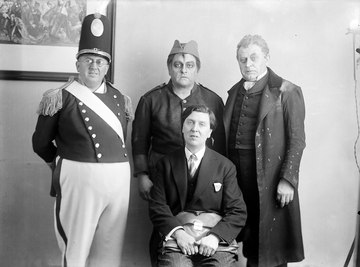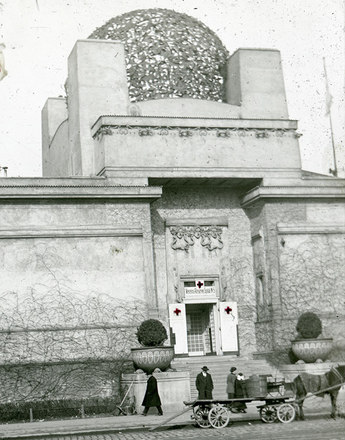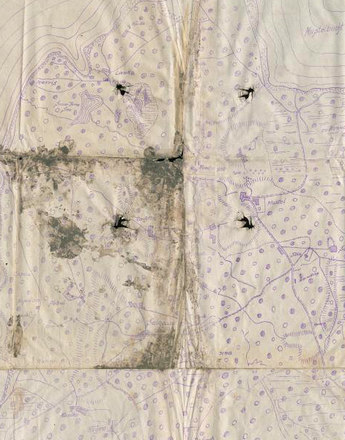Militarism and Terror Set to Music
While Richard Strauss’s musical output continued apparently uninfluenced and unimpressed by the terror of the First World War, there are two major connecting lines to be drawn between the music of Alban Berg and the war.
The first of these concerns the last of the Drei Orchesterstücke (Three Pieces for Orchestra), op.6, which were mostly composed before August 1914. This movement, marked as ‘March’ in the score, suggests a terrible vision of the last days and a premonition of all that was lying in wait for the European world in the shape of death, chaos and destruction. It is no chance that this part was completed immediately before the outbreak of war.
A close connection can also be established between Wozzeck – one of the greatest operas of the twentieth century, if not the greatest– and the First World War, even if the war itself was not actually the immediate reason for Berg’s decision to set Georg Büchner’s drama Woyzeck to music. In May 1914, one month after the twenty-nine-year-old had been called up for his medical and found ‘unfit for armed service’, he went to the first performance of Büchner’s play in Vienna. He was so impressed by the social content, the language and the formal structure of the drama that he decided spontaneously to make an opera out of it. The first sketches for the music were quickly written. The real work of composition did not, however, begin until 1915.
‘It is not only the fate of this poor person who is exploited and tormented by the whole world that upsets me so much,’ he wrote to his friend, the composer Anton Webern, ‘but also the tremendous atmospheric content of the individual scenes’. In the course of the war empathy with the figure of Woyzeck, the tormented and abused soldier, was enlarged by Berg’s own experience of military service, as a letter to his wife shows. ‘There’s a bit of me in the figure of Woyzeck after all, ever since I’ve been spending these war years in a way that makes me just as dependent on hated people, tied, ailing, unfree, resigned, humiliated in fact.’ In his book on the life and work of Alban Berg Willi Reich reports that the composer’s inspiration for the chorus of the sleeping soldiers in Act II, Scene 5, came from the dejected atmosphere in the dormitories of the barracks in which he was quartered.
The outbreak of the First World War changed Berg’s situation completely. Having originally been exempted, in 1915 he was again examined, classified as ‘fit for auxiliary service’ and in August was called up for three years with the army. While at first he still felt ‘tremendous impatience and restlessness because of the war’ and the ‘urge to take part, the feeling of impotence at not being able to serve the fatherland’, his opinion changed after several physical and mental breakdowns. His wife Helene, who was probably the natural daughter of Emperor Franz Joseph out of his liaison with Anna Nahowski (in Czech the name is Nahowska), turned to the emperor for help and was able to get Berg transferred to clerical work. In 1916 he was sent to the War Ministry as a clerk and on several occasions was granted leave for weeks at a time. (He used these periods to work on Wozzeck.)
In the middle of the work on the inn scene in Act II the phrase ‘end of the war’ occurs. The opera was completed in 1921. Parts of the music were heard on 15 June 1924 in a concertante performance conducted by Hermann Scherchen under the title Drei Bruchstücke aus Wozzeck (Three Fragments from Wozzeck). The stage premiere took place at the State Opera Unter den Linden in Berlin under Erich Kleiber on 14 December 1925.
The Pieces for Orchestra and the opera are also closely connected musically. They are among the most impressive works of art which owe their creation to the World War.
Translation: Leigh Bailey
De Voto, Mark: Alban Bergs Drei Orchesterstücke op. 6: Struktur, Thematik und ihr Verhältnis zu Wozzeck, in: Grasberger, Franz/Stefan, Rudolf (Hrsg.): Alban Berg Studien, Bd. 2, Wien 1981, 97-107
Hilmar, Ernst: Wozzeck von Alban Berg. Entstehung – erste Erfolge – Repressionen (1914 – 1935), Wien 1975
Reich, Willi: A guide to Alban Berg’s opera Wozzeck. New York 1932
Tonaufnahme "3 Orchesterstücke" Alban Berg. Unter: http://klassik.s-fahl.de/index.php?option=com_content&view=article&id=55... (20.06.2014)
Quotes:
„It is not only the fate ...“: Hilmar, Ernst: Wozzeck von Alban Berg, 21(Translation)
„There’s a bit of me ...“: Berg, Helene (Hrsg.): Alban Berg, Briefe an seine Frau, München/Wien 1965, 376 (Translation)
„tremendous impatience and restlessness ...“ zitiert nach: Scherliess, Volker: Alban Berg, Reinbek bei Hamburg 1975, 60 (Translation)
-
Chapters
- ‘Long jackets instead of Tailcoats’ – The Music Business in Times of Austerity
- Arousing Patriotic Sentiments in the Concert of Nations
- ‘In War the Muses Learn How to Serve’
- Serious Times – Serious Art
- ‘I’d like to dance, I’d like to shout for joy’ – Popular Music in the First World War
- ‘German Musical Life and How to Delouse It’ – Music for Use in the War
- ‘What the soldier in battle dress is singing now will be sung by the entire German people in rare unity.’ – Soldiers’ Songs as Collectors’ Items
- ‘It’s Hugo’s damned duty not to die for the fatherland before I’ve got my Act III.’ – Richard Strauss and the First World War
- Militarism and Terror Set to Music
- ‘La Victoire en chantant’ – The French chanson in the First World War
- Musical Innovations in the First World War
- Composers’ Fates: War, Death and the Longing for Peace and Overcoming Memories
- Star Composers and the Great War



